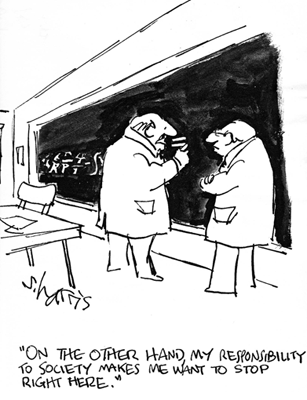
by Matteo Masto
Since the beginning of my Ph.D. research almost two years ago, I have been reflecting on the responsibilities scientists have towards society, particularly in light of the privileges we often take for granted. As members of a highly educated group with access to advanced facilities like cutting-edge laboratories, supercomputers and interactions with highly qualified colleagues, we enjoy a unique position. Unlike other professions, science often self-regulates its performance evaluation and quality definition1. Moreover, much of our research is funded by public money, which entrusts us with the responsibility to use these funds wisely.
It thus naturally follows that recognizing our privileged position—partly earned through personal effort but largely due to the fortune of being born in a favorable part of the world—should inspire us to give back to society. For this reason I often wonder how our contributions fit within societal priorities, especially compared to essential professions like farmers, healthcare providers, and construction workers, etc. Our impact can seem less tangible as science becomes more specialized2, which can sometimes cause us to lose sight of our broader purpose.

At this stage, asking ourselves, ”What can we do to fulfill our responsibilities as scientists?” can be the tipping point for what I could call ”aware research.” This involves consciously guiding our research to consider environmental and societal impacts alongside scientific ones. In practice, for instance, with climate change being the biggest threat of our times3 and most of our energy coming from fossil fuels4, we have a responsibility to make our science as sustainable as possible. An example can be to devote resources to projects that consider environmental and societal concerns in addition to scientific goals. As Carl Friedrich von Weizsäcker said ”if it is romantic to want to throw off technology, it is conversely childish to do everything that is technically possible”5. On the contrary one may argue that many world-changing discoveries in science have happened by chance6, but this approach can be inefficient and expensive, particularly considering the costs of data production, storage, and analysis, and the environmental impact associated with them.
Taking an example from the field of computational science, we are witnessing a concerning trend of massive data production, that is leading to significant storage and analysis issues7. The environmental impact is substantial, and the yield of analyzed over acquired data is often poor, indicating inefficient and costly research planning. As scientists, we now have the responsibility to consider this in our research, directing projects towards smart data handling rather than mass production.
To summarize the aim of the discussion above, this article wants to be an invitation for every scientist to reflect upon these issues and adopt a more ”aware” approach to the future of scientific research.
References
- Harald A. Mieg. “Science as a Profession: And Its Responsibility”. In: Studies in History and Philosophy of Science(Netherlands). Vol. 57. Springer Science and Business Media B.V., 2022, pp. 67 DOI: 10.1007/978-3-030-91597-1{_}4
- Stefan Wuchty, Benjamin Jones, and Brian Uzzi. “The Increasing Dominance of Teams in Production of Knowledge”. In: Science (New York, N.Y.) 316 (June 2007), pp. 1036–9. DOI: 10.1126/science.1136099.
- United Nations. “Climate Change ‘Biggest Threat Modern Humans Have Ever Faced’, World-Renowned Naturalist Tells Security Council, Calls for Greater Global Cooperation”. In: (2021). URL: https://press.un.org/en/2021/sc14445.doc.htm.
- Hannah Ritchie and Pablo Rosado. “Energy Mix”. In: Our World in Data (2020). https://ourworldindata.org/energymix.
- Carl Friedrich von Weizsäcker. Die Verantwortung der Wissenschaft im Atomzeitalter. Verlag von Vandenhoeck Ruprecht in Göttingen, 1963.
- In: URL: https://www.learning-mind.com/accidental-discoveries/
- Tom Siegfried. “Why Big Data is bad for science”. In: ScienceNews (2013). URL: https://www.sciencenews.org/blog/context/why-big-data-bad-science.
